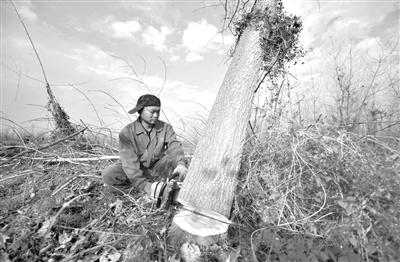Millions of poplars cut down for ecological restoration
- By Wu Jin
 0 Comment(s)
0 Comment(s) Print
Print E-mail China.org.cn, January 3, 2018
E-mail China.org.cn, January 3, 2018
Woods may sometimes do more harm than good, if they have been planted unscrupulously and have grown out of control.

Exemplified by the three million deforested poplars growing along the banks of Dongting Lake, China's second largest natural plain water reservoir, located in southern Hunan Province, this signals a failing effort to sustain the equilibrium of the region's ecological system in the region.
According to the Central Environmental Inspection Group, set up almost two years ago for the supervision of environmental protection work nationwide, the poplars, belonging to the species of Populus Euroamericana, and covering an area of 390,100 mu (26,007 hectares), had severely threatened the lakeside ecological system.
According to the report issued by the Group to the local government, between 2013 and 2016, the water quality was found to have deteriorated as the composition of level-III water of each monitored section dropped from 36.4 percent to zero and the total phosphorus concentration rose to 97.9 percent. Thus, "the local environment was by no means satisfactory," the report concluded.
Known as home to rice and fish, Dongting Lake and its surroundings have been listed as one of the important wetlands in "the Convention of Wetlands of International Importance Especially as Waterfowl Habitat," otherwise known as the "Ramsar Convention", which was enacted in 1975.
During the 1980s, poplars were introduced into the area around the lake as a raw material for paper-making factories. However, around 2000, the massive expansion of paper-making production, seen as a substitute for shrinking field labor, led to a tree-planting mania; as a consequence, they engulfed the paddy fields resulting in considerably lower returns.
Even though Xinhua News Agency warned in a report published in 2003 that the loss of paddy fields displaced by the prevalent plantation of trees was alarming, the planters merely retreated from the original fields and reclaimed new wetlands in the central part of the area regardless of the fact that there were several important conservation-related projects there.
The landscape of the natural reserves has been damaged by the sweeping plantation of woods as the planters rooted up reeds, pumped out water and changed and cemented the soil covering the land.
The hardened layers of the land and the lavish use of the pesticides have resulted in a great damage to the local ecological system where neither migratory birds nor grasses could be spotted any longer. Besides, their immense numbers and sizes impede flood prevention efforts.
Wan Xianjun, head of the wetland management department of the forestry bureau in Ruanjiang City, Hunan Province, said, the poplars should have not been allowed to be planted in areas of natural conservancy. However, his remark caused immense animosity among big and influential planters.
"They challenged me, saying they were under the protection of the Property Law and Labor Contract Law, which to them were more powerful than the regulations of wetland protection," Wan said.
However, the woods eventually faced doomsday when the Central Environmental Inspection Group required local governments to clear out the poplars by the end of last year.
Chen Yue, a woodcutter, said the trees pulled down were those they had planted more than a decade ago, but now they had to annihilate them at a rate of 700 to 800 in a day.
"The loss is very substantial," said Li Wei, a businessman in charge of Honghai Agricultural Comprehensive Development Co. Ltd. "However, we have to unconditionally conform to the country's strategic development regarding ecological protection."
The timbers will be transported to Zhejiang and Shandong provinces for furniture manufacturing.






Go to Forum >>0 Comment(s)